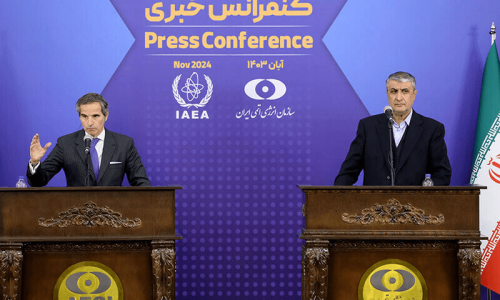KARACHI, Jan 27: While Karachi has five major industrial estates with over 6,000 industrial units, only one industrial estate in Korangi has a combined effluent treatment plant, with the result that most industries dump toxic waste in an unauthorised and environmentally damaging manner, Dawn has learnt.
The lack of regard for environmental standards also means that Pakistani companies may have trouble exporting their goods abroad, as their factories’ waste dumping procedures do not meet international standards, according to experts.
The Combined Tannery Effluent Plant in the Korangi Industrial Area is the only plant of its kind in the city. The plant is a good example of how cooperation between industrialists and the government, and seriousness and sensitivity to environmental issues, can result in environmental requirements being met, according to an industrialist.
The CTEP only caters to a few industries, however.
According to a 2004 IUCN Pakistan report, with the exception of a few industrial units, almost all of Karachi’s 6,000 units were discharging their untreated effluents (containing heavy metals and their compounds) directly into bodies of water leading to the sea.
Surveys and studies have established that the marine environment around Karachi has become highly toxic, harming aquatic flora and fauna. The soil at vegetable farms along the Malir and Lyari rivers has also become tainted with zinc and copper deposits.
Today, industries in Karachi’s five industrial estates (and other areas) are dumping untreated toxic biological and chemical waste amounting to an estimated 200 million gallons per day. Other than the effluent treatment plant in KIA, there are no treatment plants provided by either the government or industrial associations.
The Sindh Industrial and Trading Estate alone has 3,200 industrial units in more than 65 categories, including chemical, textile, soap and detergent, paints and varnishes, edible oils, automobile vending and cable and conductor manufacturing, but there is no combined waste treatment plant anywhere on the premises.
Industrialists say that constructing such a plant would overburden the industries substantially, despite the fact that the estate was established in 1947 on the specific condition that factory effluents would be treated according to the Factories Act of 1934.
Insiders blame a lack of awareness as well as the poor implementation of laws for the absence of an environmentally friendly attitude on the part of industrialists.
They do, however, point to the CTEP in Korangi as an example of what can be done if the government and industrialists cooperate with one another.
The effluents from factories are usually dumped in domestic sewers, rain drains or even in public and private lands.
A source at the Karachi Water and Sewerage Board said that about 10 per cent of industrial effluents found their way into government-run domestic sewerage treatment plants, adding that industrialists who allowed their waste to be dumped in public sewers could be held accountable for doing so.
Zubair Motiwala, an industrialist, told Dawn that SITE mostly consisted of textile units, which produced about 52 million gallons of effluents every day. He said the setting up of one or more combined effluent treatment plants was the only way to avoid water and soil contamination, but added that the government was failing to show its commitment to the cause. Mr Motiwala said that such projects had been planned in the past with support from foreign donors, but were not completed due to the government’s lack of interest.
Responding to a question, he said factory owners had also approached the City District Government Karachi for help with regard to the safe disposal of toxic industrial waste, as the CDGK was developing a solid waste management plan for the entire city.
The chairman of the SITE Association of Industries, M.A. Jabbar, said it was his understanding that in most cases toxic industrial waste was mixed with general waste and then dumped in designated public or private lands. He added that that system needed to be rethought.
Regarding the establishment of combined effluent treatment plants, Mr Jabbar said the government should take up its role as a regulator and provide industrialists a plan for the installation of such a plant, or else it would become difficult to mitigate the environmental damage being done.
Mr Jabbar said industrialists were ready to match any funds the government provided as seed money for the construction of effluent treatment plants. “In the meantime we are convincing members to ensure compliance with all existing environmental laws,” he said, “particularly because the majority of them are not aware of the different environmental quality standards applicable to them.”
Referring to strict international trade laws, Mr Jabbar said he feared that Pakistani exports could drop due to non-compliance with environmental laws and NEQ standards.
A director in the Sindh Environmental Protection Agency, Naeem A. Mughal, said that it was the responsibility of the individual industries to care for the environment and to ensure that any damage was mitigated. He said that industrialists were expected to know the rules regarding the disposal of effluents and the disposal of solid and toxic waste. He added that sometimes they (the industrialists) tried and wrongly shifted the blame onto contractors.
Responding to a question, Mr Mughal said he could not provide any exact data regarding the generation and disposal of solid and toxic waste, or the quantity of effluents discharged by industries in Karachi. He said this was largely because industries did not welcome the collection of such data by Sepa.













































Dear visitor, the comments section is undergoing an overhaul and will return soon.